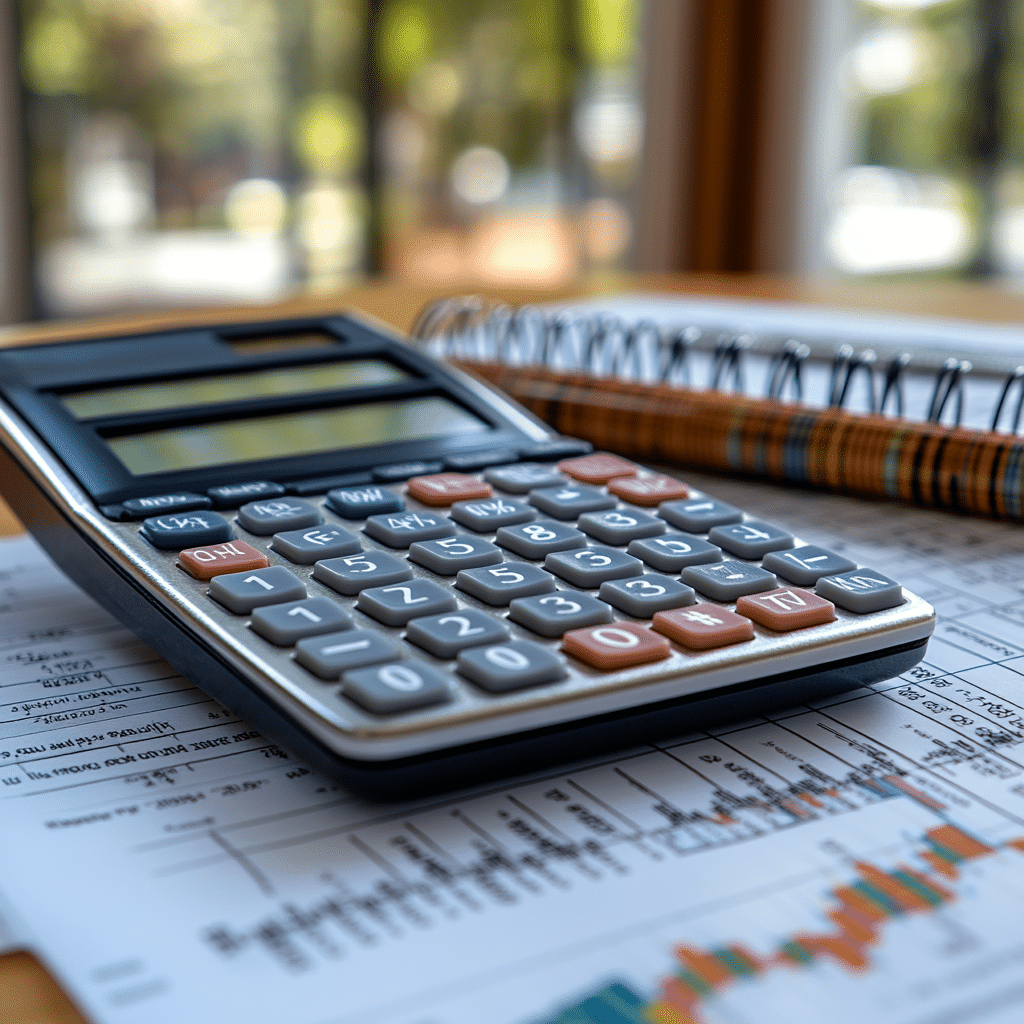Step-by-Step Guide: How To Calculate Capital Gains Tax
Calculating capital gains tax can seem like deciphering a new language. But don’t sweat it—we’re breaking it down for you in plain English. This guide will walk you through every step you need to calculate your capital gains tax accurately. By the end, you’ll feel confident, informed, and ready to tackle your finances head-on. Remember, at Mortgage Rater, we’ve got your back in mastering these financial concepts.

Understand the Basics of Capital Gains Tax
Before diving into the numbers, let’s clear up what capital gains tax is. It’s the tax you pay on the profit from selling an asset. This can be stocks, bonds, real estate, or even artwork. The U.S. government, both federal and state, imposes this tax, and its rate varies based on your income and how long you’ve held the asset.
Types of Capital Gains
- Short-Term Capital Gains: For assets held for one year or less. These gains are taxed as ordinary income, making them potentially subject to higher rates.
- Long-Term Capital Gains: For assets held for more than one year. These are generally taxed at lower rates depending on your taxable income.
For example, Jane Smith bought Apple shares in January 2023 and sold them in June 2023. Her gain is short-term. But if she sells shares she bought in January 2022, her gain is long-term.

How to Determine Whether Your Gain is Short-Term or Long-Term
Your first move in calculating capital gains tax is to figure out the gain type. Here’s how:
- Short-Term: If you sold the asset within a year of purchasing it, this is a short-term gain.
- Long-Term: If you sold it after holding it for more than a year, this is a long-term gain.
Understanding this is crucial because it determines your tax rate—short-term gains can be taxed as high as 37%, while long-term rates are generally lower.
| Component | Description |
| Acquisition Cost | The original amount paid for the asset including purchase price, associated fees, and improvement costs. |
| Selling Price | The amount the asset is sold for, minus any selling expenses such as broker fees or advertising costs. |
| Capital Gain | The difference between the selling price and the acquisition cost. Formula: Selling Price – Acquisition Cost. |
| Holding Period | The duration for which the asset is held. Determines whether the gain qualifies as short-term (less than 1 year) or long-term (more than 1 year). |
| Short-Term Capital Gains Tax Rate | Tax rate applied if the asset is held for less than a year. Typically taxed at the same rate as ordinary income (10% to 37% in the U.S., depending on the income bracket). |
| Long-Term Capital Gains Tax Rate | Tax rate for assets held longer than a year. Often lower than the short-term rate (0%, 15%, or 20%, depending on the income level in the U.S.). |
| Exemptions and Deductions | Specific exemptions or deductions that may apply such as primary residence exclusion (up to $250,000 for singles, $500,000 for married couples) in the U.S. |
| Net Investment Income Tax (NIIT) | An additional 3.8% tax that applies to capital gains for individuals with high-income earnings (above $200,000 for singles or $250,000 for married couples in the U.S.). |
| Applicable Forms | U.S. taxpayers must report capital gains using IRS Form 1040 Schedule D, alongside Form 8949. |
Calculate Your Capital Gain or Loss
To calculate your capital gains tax, you need to know the exact gain or loss:
- Selling Price: The amount for which you sold the asset.
- Purchase Price (Basis): The amount you paid for the asset, including any associated costs like broker fees.
- Capital Gain/Loss: Subtract the purchase price from the selling price.
Formula:
– Capital Gain = Selling Price – Purchase Price
– Capital Loss = Purchase Price – Selling Price
For instance, John Doe bought a painting for $5,000 in 2015 and sold it for $15,000 in 2024. His capital gain is $10,000.
Apply the Relevant Tax Rate
Next, you need to apply the appropriate tax rate to your capital gain. As of 2024, the federal long-term capital gains tax rates are 0%, 15%, or 20%, depending on your taxable income. Short-term gains are taxed at ordinary income rates.
Let’s take Maria Lopez, who earned a long-term capital gain of $50,000 with a taxable income of $60,000. She falls into the 15% long-term capital gains tax bracket, so her tax is $50,000 * 0.15 = $7,500.
Factor in State Taxes
Apart from federal taxes, don’t forget about state taxes. States like California tax capital gains as ordinary income, which can be quite hefty.
Tom Johnson, a California resident, earned $20,000 in capital gains from a property sale. Given California’s tax rates, this state tax bite could be significant. To better understand specific state implications, check resources like the Bobby Shriver site for nuanced insights.
Consider Deductions and Exemptions
There are several ways to potentially reduce your capital gains tax:
- Primary Residence Exemption: If you sell your primary home, you may exclude up to $250,000 of the gain ($500,000 for married couples).
- Investment Expenses: Costs related to buying and selling an asset can often be deducted.
For example, Sophie and Mike Rogers sold their home, earning a $400,000 gain. They qualify for the $500,000 exclusion and owe no capital gains tax.
Report Your Capital Gains
On your tax return, report your capital gains using IRS Form 8949 and Schedule D. Keeping detailed records is crucial for accurate reporting and preparing in case of an audit.
Strategic Planning to Minimize Capital Gains Tax
Planning can significantly reduce your tax burden. Here are a few strategies:
- Tax-Loss Harvesting: Offset gains by realizing losses on other investments.
- Holding Investments Long-Term: Benefit from lower long-term tax rates.
- Utilize Tax-Advantaged Accounts: Place investments in accounts like Roth IRAs for potentially tax-free gains.
Bringing It All Together
Understanding how to calculate capital gains tax empowers you to manage your finances smartly. By learning the critical steps—from determining the gain type to applying the right tax rates and thinking strategically—you can minimize your tax liabilities. Armed with this guide, you’re well-prepared to make informed decisions that can boost your financial wellbeing in 2024 and beyond.
Don’t forget: Knowledge is power. Grasping the nuances of capital gains tax lets you handle your investments and obligations confidently.
For more on tax implications and details, check articles on What are Capital gains taxes, Single-family Home, and Short-Term Capital gains tax.
Navigating the mortgage and tax landscape can be challenging, but with Mortgage Rater by your side, you’ve got a trusted guide.
How to Calculate Capital Gains Tax Decoded
Curious about how to calculate capital gains tax? It’s less daunting than it appears. There’s a quirky side to taxes you may not know. Taxes might make you want to pull your hair out, but some trivia here and there can make the subject a tad lighter.
Fun Trivia About Capital Gains Tax
Ever heard the saying, baltimore marathon? Well, calculating your capital gains tax isn’t quite a marathon, but it can feel like running in circles if you’re unsure where to start. A quick tidbit to footnote: Did you know that the duration you hold onto an asset affects whether you pay short-term or long-term capital gains tax? Short-term gains (less than a year) get taxed as regular income. Holding onto your investment for more than just a year gives you a tax break with a lower rate on long-term gains.
Switching gears, methamphetamines have been (unfortunately) figured as a bizarre comparison in understanding financial concepts. As odd as it sounds, if you’re wondering, How long Does meth high last? just remember it’s a short-term burst like short-term capital gains tax. They both have their timelines and consequences. Long-term gains tax is like the marathon of your financial journey – hang in there, you’ve got better rates to look forward to.
Interesting Calculations and Comparisons
You know calculating your capital gains tax isn’t just about crunching numbers. It’s about understanding your investments’ narrative. Imagining the bewilderment some feel towards taxes, it’s akin to confronting those who snort meth for a high – dangerously unpredictable. Calculating correctly, and consistently, keeps you stable and out of trouble.
In a nutshell, understanding how to calculate capital gains tax isn’t just essential; it’s also a journey peppered with interesting facts and comparisons. It’s never as straightforward as it seems at first glance, but with every step, you become more adept and knowledgeable about your financial landscape. And remember, always seek professional advice if you’re in over your head.



